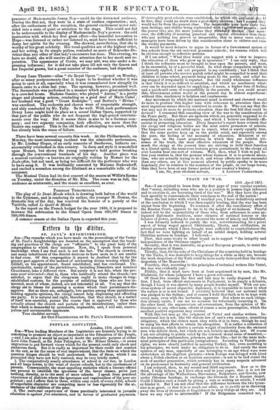POk111.AR EDUCATION - .
London, 17th April 1855. SUE--When leading MeMbera of the Legislature are honestly trying to do something to promote an object so important as the Education of the People, —and I am sure; t would be unjust to doubt the patriotic _purpose of either Lord John Ruasell, or Sir John Pakington, or Mr. Milner Gibson, —it seems Ungracious to put forward views which for the present could only check and embarrass them. But it is really as important for their credit and comfort in the end, as for the cause of real improvement, that the facts on which the question hinges should be *ell understood. Some of these, which I sin persuaded they have not fully realized, may be very briefly stated. 1. The comparatively scanty attendance at school is not due, in London and all large totem., to the want of decent schools, but to the carelessness of parents. Consequently, the most appalling statistics which a literary official can present to establish the ignorance of the lower classes, prove just nothing, directly, as to the need of more schools. I speak from practical_ experience of districts where the ignorance and vagabondism of the poor are greatest ; and I affirm that in these, within easy reach of every child, schools of respectable character are competing more or less vigorously for the at- tendance of the children of the poor. 2. The universal experience of those practically interested id juvenile education is against free admission, and in favour of graduated payments. If thoroughly good schools were establishe to which the be free, they would no doubt draw a good y children_ ; tiitq would not be from the poorest class. The speetalde
man feelings, and dislike being confounded *Uh yur rs ; and the poorer they are, the more jealous they it, 1And more-
over, the difficulty of securing punctual end regular attendance-from those who pay nothing has proved so insuperable, that in many oases school- managers have been driven by this oonsideration alone to enforce and raise the weekly payments.
It would be most delusive to argue in favour of a Government system of free schools from the old endowed grammar schools ; for reasons which will be obvious enough to reflective persons. If I am asked, " What then would you suggest with a view to improve the education of those who grow up in ignorance ? " I can only reply, that I think the influence must be brought to bear upon the parents, and must, to be successful, be of a powerful kind. In what shape compulsion might be judiciously applied, I am not prepared to say confidently ; but I think that at least all parents who receive parish relief might be compelled to send their children to some school, payment being made by the parish, and relief be- ing stopped if irregularity is reported. But the really wholesome influence is that which it is so difficult to establish, and which no machinery what- ever can be depended upon for supplying,—I mean, a higher tone of feeling and a quickened sense of responsibility in the parents. If you could secure this, Government action would at the present day be almost superfluous : without this, machinery is helpless and cumbersome.
Any movement by which the national mind is stirred and elevated would do more to produce this higher tone with reference to education than the most ingenious means directly contrived to create it. Who can say that the wet may not do more to promote education than the best bill that could be devised ? I commend this consoling view of the war to the consideration of the Peace party. But there are agencies which are generally supposed to do something in raising public morality, and which I believe are directly effi- cacious in promoting education. Every Inspector's report bears witness that the clergy and religious bodies are the most active promoter& of schools. The Inspectors are not called upon to report, what is surely equally true, that the same parties keep up in the public mind, and especially among the poor, the feeling of the necessity of education. Ministers of re- ligion are, in the exact proportion in which they are faithful wit- nesses of the truth, the most effective educator& of the people. How much the clergy at the present time are striving to fulfil their function in a liberal spirit, the numerous lectures given gratuitously by the clergy all over London bear one sort of witness. Well, then, what I wish to put be- fore your readers is, that the persons whose business it is to promote educa- tion, who are actually trying to do it, and whose efforts are more successful than any others, are at this moment allowed by public apathy to be more hopelessly few in relation to the numbers of the people, in our large towns, than they have been at any former period of our country's history.
hi they r hu-
I am, Sir, your obedient servant, A Los000rs CLEROThAN.


























 Previous page
Previous page